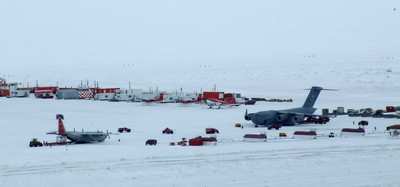Cargo Flights From Christchurch, New Zealand Are Underway
In the Southern Hemisphere, spring officially begins September
23. That includes Antarctica, and for members of the US Air Force
assigned to Operation Deep Freeze, late winter flights, known as
WINFLY, for Operation Deep Freeze 2011-2012 began August 20. Deep
Freeze is a joint service, interagency activity that supports the
National Science Foundation (NSF), which manages the US Antarctic
Program.

Lt. Gen. Stanley T. Kresge, the commander of 13th Air Force, is
dual-hatted as the commander of Joint Task Force-Support Forces
Antarctica, based at Joint Base Pearl-Harbor-Hickam, Hawaii. The
joint task force's main summer season in Antarctica is slated to
begin Sept. 28.
A C-17 Globemaster III from Joint Base Lewis-McChord, WA., began
delivering passengers and cargo to the NSF McMurdo Station,
Antarctica, in support of the United States Antarctic Program.
Scientists and support personnel at the station will start
pre-summer projects, augment maintenance personnel, and prepare
skiways, ice runways and an ice pier.
The airlift part of Operation Deep Freeze operates from two
primary locations with C-17s situated at Christchurch, New Zealand
and LC-130 Hercules forward based at McMurdo Station, Antarctica,
beginning in late October. McMurdo is located on the southern tip
of Ross Island, a territory of New Zealand.
The operation year is divided into three main phases: WINFLY,
which is currently ongoing, followed by the main summer season and
the winter phase. WINFLY is the preparation phase between winter
and summer when additional support personnel arrive to prepare the
station for the upcoming science field season.
NSF manages the US Antarctic Program through which it
coordinates all US scientific research on the southernmost
continent and aboard ships in the Southern Ocean as well as related
logistics support.
"WINFLY missions are important for total force C-17 crews," said
Lt. Col. Edward Vaughan, the Deep Freeze interim director of joint
operations. "Aside from hauling support passengers and cargo, the
National Science Foundation also permits a night-vision goggle
training mission. This annual training mission ensures that C-17
crews are prepared to execute their mission in Antarctica year
round."
US military support for Operation Deep Freeze is a Pacific
Command responsibility organized as Joint Task Force -Support
Forces Antarctica. The Joint Task Force includes cargo and fuel
tanker ships provided by Military Sealift Command, active- duty and
Reserve C-17 support from the 62nd and 446th Airlift Wings at JB
Lewis-McChord, ski-equipped LC-130 Hercules flown by the 109th AW
of the New York Air National Guard, as well as Coast Guard
icebreakers and the Navy Cargo Handling Battalion One to provide
critical port services at McMurdo Station.
The US military is uniquely equipped and trained to operate
in such an austere environment and has therefore provided annual
support to US Antarctic research since Rear Adm. Richard E.
Byrd began such operations in 1955.
 ANN's Daily Aero-Linx (04.30.25)
ANN's Daily Aero-Linx (04.30.25) ANN FAQ: Turn On Post Notifications
ANN FAQ: Turn On Post Notifications Classic Aero-TV: Agile Aeros Jeff Greason--Disruptive Aerospace Innovations
Classic Aero-TV: Agile Aeros Jeff Greason--Disruptive Aerospace Innovations Aero-News: Quote of the Day (04.30.25)
Aero-News: Quote of the Day (04.30.25) ANN's Daily Aero-Term (04.30.25): Expedite
ANN's Daily Aero-Term (04.30.25): Expedite



